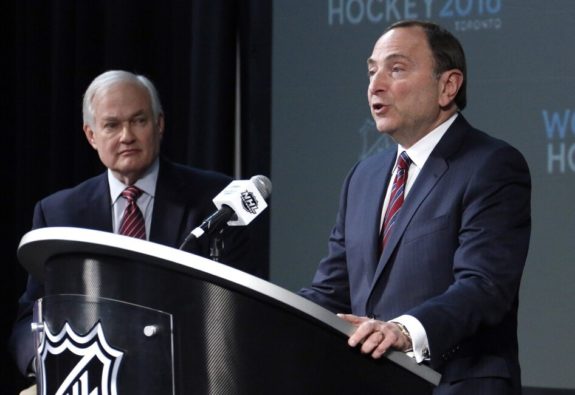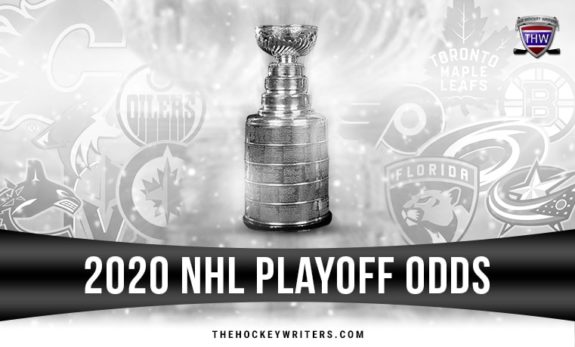It seems that almost all of us accept that there must be some resolution to the NHL’s 2019-20 season and Stanley Cup Playoffs. (No, Boston Bruins fans, we don’t think commissioner Gary Bettman should just hand over the Cup, even though your Bruins are leading in the standings.)

But we also want to get back to “normal” NHL hockey, with a preseason, an 82-game regular season, and four rounds of best-of-seven playoffs. That can be done if the NHL and the NHLPA agree to a shortened 2020-21 season.
Where Are We Now?
For hockey to resume this year, and for a reasonable playoff, lots of pieces need to fall into place:
- Governments need to lift travel restrictions (when it is safe to do so).
- Players and team staff need to travel. (To where we don’t yet know. Perhaps to all 31 NHL cities, perhaps to a few designated cities.)
- Players and staff need to be quarantined after travel (likely for two weeks).
- Players need to get back into game shape, not only for the quality of the on-ice presentation, but also for player safety.
- Regular player testing for COVID-19 needs to be in place, but not at the expense of testing symptomatic people in the local communities.
Where Are We Going Next?
Once all that is done, the league and the players union need to reach an agreement on what comes next. Should there be some additional “regular season” games to determine which teams make the playoffs? Does the NHL move straight to the playoffs? If so, how does the league determine which teams qualify?

Among the suggestions already put forward here is truncating the 2019-20 season to each team’s first 68 games and ending the regular season. Another option is adding a playoff qualification round (in accordance with the Collective Bargaining Agreement) to determine which teams make the playoffs in the wild card slots.
Related: NHL CBA – Minor Clauses Could Have Impact on Playoff Plans
Regardless of when travel restrictions are lifted and regardless of what form the remainder of the 2019-20 season takes, we’re looking at several months before the Stanley Cup can be awarded.
Following the Cup presentation, we’ll need an offseason for the 2020 Entry Draft, free agency, player rest and recuperation, and for the fans to breathe. Trying to add a standard 82-game regular season for 2020-21 plus a full four rounds of playoffs would push next season well past the typical mid-June Cup presentation.
Related: 2020 NHL Draft Guide – Updated
Let me, therefore, suggest that the league and the union look to resume “normal” scheduling in 2021-22. Let’s wrap up 2019-20 however we can, then plan on resuming normality not in 2020-21, but rather in 2021-22 (with the addition of the new Seattle franchise). Here’s how we can do it:
- Plan on awarding the 2020-21 Stanley Cup in mid-June 2021, with playoffs beginning the second week of April 2021.
- Next, jump back to the awarding of the 2020 Stanley Cup. (Again, taking into account travel restrictions, quarantine, player conditioning, qualification, and playoffs.)
- Add some time after the 2020 Cup presentation for an offseason.
- Now, and here’s the key, look at the time between the end of the “offseason” following the 2019-20 season (sometime this Fall) and the beginning of the 2020-21 playoffs (next April). Determine how many regular-season games can be played within that time frame and create a “regular season” schedule.
Next year’s “regular season” (that’s the 2020-21 season) can be truncated to, for example, 48 games per team. Thanks to the famous lockout, the 1994-95 season was 48-games long and didn’t begin until January 1995. That year the start of the playoffs was pushed back until early May, and didn’t end until June 24.

That might be a workable model for next season (2020-21). However, if pieces fall into place and the 2020-21 regular season can begin in December 2020, perhaps there can be more than 48 games in the season with the playoffs still beginning in April and ending no later than the second week of June 2021.
Of course, the whole question of revenue needs to be addressed. It does us no good to resume hockey if the league and/or some of its franchises are in financial ruin by the summer of 2021. By the start of the truncated 2020-21 regular season, all restrictions on large gatherings should hopefully be a bad memory and fans can and will attend games. But TV and other revenue sources will need to undergo some revision to ensure financial stability throughout the NHL.
Where Should We Be Going Next?
Finish this season (2019-20) and award the Stanley Cup. Shorten the following regular season (2020-21), but allow for a regular playoff schedule. Then, finally, let’s get back to a “normal” 82-game season and playoffs starting with the 2021-22 season.
Related: Top 10 Mennonites in NHL History
Sacrificing part of the 2020-21 regular season in order to put NHL hockey back on track starting in 2021-22 is a workable plan, with the 1994-95 shortened season as a template from which to work. Rather than letting the Coronavirus Pandemic of 2020 leave its ugly footprint on hockey for years to come, let’s use a shortened 2020-21 regular season to get us back to normal, starting with the 2021-22 regular season.